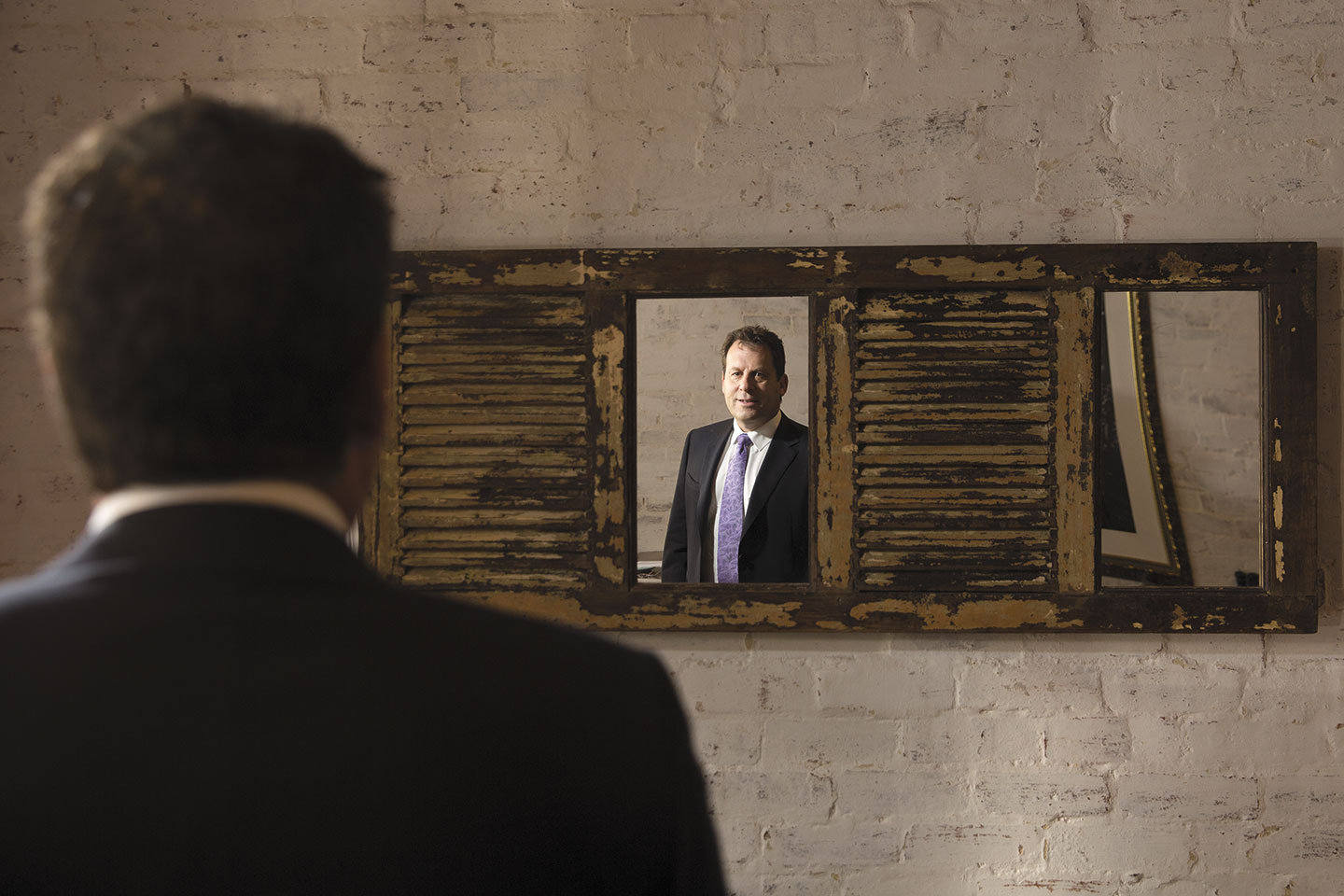One of the state’s most experienced financial services leaders, John Van Der Wielen says the opportunity to put something back into the community was one factor motivating his move to HBF.


John Van Der Wielen has spent his entire career in the insurance business after leaving Hamilton Hill High School at the age of 15 to work as a motor vehicle covenants clerk with SGIO.
Mr Van Der Wielen, who this year became CEO of health insurance mutual HBF, often ponders why he left school at that age
“I think a big family, five children, fantastic mum and dad, fantastic upbringing … but we were probably encouraged to get out and get some work and move on into the practical world, which is exactly what I did, so I was very independent,” Mr Van Der Wielen said.
He caught up on his (missed) education in his mid-20s and has been an active student since that time, completing an MBA and studying at British institutions such as the University of Oxford and London Business School.
In 1998, Mr Van Der Wielen joined Bank of Scotland to set up St Andrew’s Insurance Australia, a position he held in 2002 when he was named one of the inaugural Business News 40under40. He ran St Andrew’s for almost 10 years before heading to London in 2007 to fix up insurance group Clerical Medical, which was also owned by what had become HBOS.
Mr Van Der Wielen said the culture at HBOS in the UK was a shock after working under the prudential regime of Australia with a local independent board.
“I went to HBOS and I did see what I’d call a reckless culture, so I was quite surprised,” he said.
“I was an Australian. I was a non-banker, more insurance and wealth management, and I saw what you’d called the heady days and I did, and my wife can substantiate this, often come home and say ‘Gee, this HBOS crowd look extra risky’.”
That view turned out to be ominously accurate.
“It’s one of those things I suppose I reflect on; your intuition and your feeling to what’s right or wrong.
“I certainly went through some tough times in the crisis running an insurance company, which has a separate balance sheet to the bank, so the positive thing about insurance was we maintained that capital, that company’s still running today.
“We were taken over by Lloyd’s Banking Group, which I have the upmost respect for.”
Mr Van Der Wielen was one of the few HBOS executives to rise within the Lloyd’s Banking Group when it took over, having been appointed to the board of its insurance business. From there, he helped merge Clerical Medical, Halifax Life, and Scottish Widows.
“I’ll tell you my Aussie accent in England was welcome and that was because Australian bankers and financial services were well respected. I was in HBOS but not a banker and therefore Lloyd’s Banking Group saw me as a person they wanted to keep as a part of the new management structure.”
He returned to Australia in 2010 to run ANZ’s wealth division after it had acquired ING’s wealth management, a role that was significant and exciting, especially given the turmoil in Europe.
“I look at the boom times in Australian banking and, contrary to maybe some opinion, I think (ANZ CEO) Mike Smith was doing the right thing,” Mr Van Der Wielen said.
“He was trying to create a bank instead of being a large building society. I’ll give you another candid opinion, that’s what I think of Australian banks – they’re just enormously large building societies.
“He (Smith) tried to take it into Asia and I think he’s done that relatively successfully.”
Mr Van Der Wielen certainly thinks the nation could have fared better from a period when our banking sector, almost alone, stood solid – drawing an analogy to any business provided an opportunity, including his own.
“The point is we probably could have, I think, expanded some of Australia's institutions a little bit better, spent money a little bit more wisely, and it’s only when times get tougher that you realise you probably could have spent money more wisely in the previous years, and I don’t see that too much different at HBF,” he said.
From a personal standpoint, however, Mr Van Der Wielen was able to capitalise on an opportunity presented by the wreckage of post-GFC Europe, after barely a year in Australia.
“I would say the most radical decision I have made in my career, and part of my conscience still struggles with it and ANZ was very good to me ... I was right in the midst of a role (with ANZ), still had a lot of the role left to carry out, but a well-known UK person by the name of Sir Clive Cowdery, who has led many insurance and wealth management acquisitions and done extremely well with them, offered me a role back in the UK where he had raised public funds, £3.8 billion, and he just bought Friends Provident, which was a listed entity, Bupa Life and AXA UK, and then it had many international subsidiaries as well.
“He bought them at a low price post the GFC, was looking for an executive team to come back to help him turn that around, divest of some entities, you know, drive share price growth and probably ultimately exit.”
His return to the UK was terrifically successful, nearly doubling shareholders’ funds during a five-year period invested in what was a blue chip share. Mr Van Der Wielen also benefited from that result with “a better windfall than a boy from Hamilton High School could have pondered on when he left school at 15”.
“That created this very significant family opportunity, which was to sign on for another five years in the UK, which we were personally happy to do it,” Mr Van Der Wielen said.
“But my wife’s and my parents were getting old, we had been out of Perth for nine and half years, and that landed me back.”
In Perth, he stayed connected with European financial services by remaining on the boards of several of the different businesses he had led, as well as becoming an adviser to private equity player Blackstone and chairing the IPO of Kyckr, an Irish regulatory technology business listed on the ASX. The latter role is the only one that remains since he joined HBF.
“The irony was I had seven boards, one located in Sydney and the other six Europe and including the Isle of Man.
“During that time I was extremely busy, I got a little bit of time to walk the dog and see the family but the rest of the time I was on the plane; and then the HBF proposition came up.”
The insurance executive stepped off all those roles except Kyckr, where he remains chair and a big believer in the possibilities of the product, which provides ASIC-style searches on companies across the globe through a single portal.
Mr Van Der Wielen sees the HBF role as an opportunity to use his experience in a very different way.
“Look, the easy attraction to the role was the fact that I genuinely was coming towards the end of my career is that I felt like it was a company that, as a not for profit, puts back into the community,” he said.
“It’s in a sector that is pivotal to Australia’s economy and community, so health, policing, education, they’re just core components of what we do on a daily basis.
“So that was incredibly motivational, the opportunity, a fantastic strong brand in Perth, I knew the company very, very well, and knew also that it’s got $1.7 billion of assets, a really strong balance sheet for the number of members it has. Enormously strong in fact.”
But he also acknowledges that the health insurance sector is increasingly competitive, more regulated and has a declining customer base.
“The new board, under the chairman, Tony Crawford, really wants to have a look at what can HBF do to not only defend its position in WA, but expand more aggressively either around Australia or elsewhere.
“We are reviewing the strategic plan and all that that global experience that I've gained, to come back to Perth and have a brand with a strong balance sheet is just great opportunity, so I've been working through the strategic plan.
“I plan to get to the end of the year with the board, and I think make some fairly major changes on the way HBF will structure itself going forward.”
Mr Van Der Wielen admits that changing a outwardly successful business like HBF is not easy.
“One of our challenges, and I think more of our internal people and the board actually realise that margins now have dropped five years running … therefore, the appetite for change in HBF is better than it ever was,” he said.
“I mean, most recently we’ve announced, as an example, that we’re closing three branches. Now, that’s a big decision for HBF. We’re a member-based company but the costs of those branches that weren’t actually efficient meant we needed to make those tough decisions, and therefore we'll make more of those decisions going forward.
“My challenge as a CEO is to keep this fantastic ethos, which is looking after the members. A genuine example is (that) we have the lowest complaints to the ombudsmen nationally of any of the health insurance players. That just tells you how well they look after their members.”
Mr Van Der Wielen believes health insurers need to work more closely with government to keep the public and private systems in balance.
“I would not like to see us end up with a US-style health system, so things do need to change and that’s what I enjoy about the job, is being able to work with government in trying to take the ability to use my experience to make change.”
Mr Van Der Wielen also plans to freshen up the management of the business by injecting new talent.
At the top of the business he has appointed Simon Walsh as general manager, strategy and ventures
The HBF chief also wants to bring more graduates into the business and get them through the health industry with a view to using their abilities and exposing younger people to the sector.














